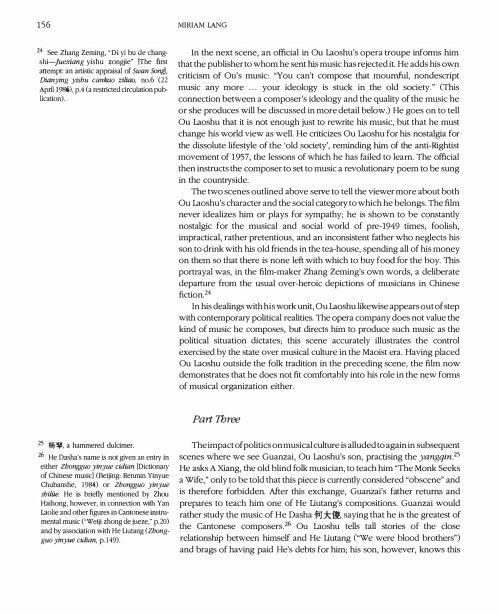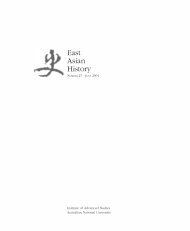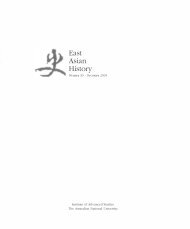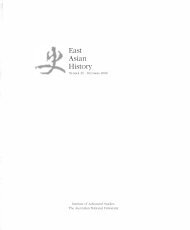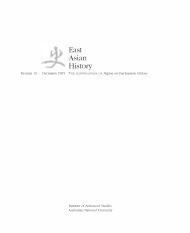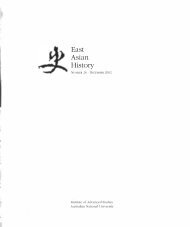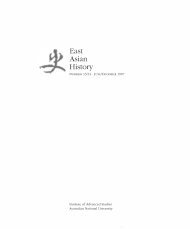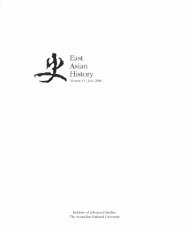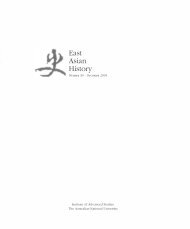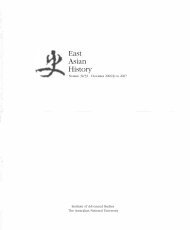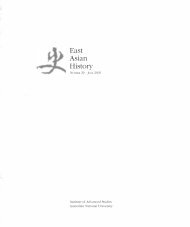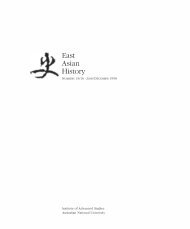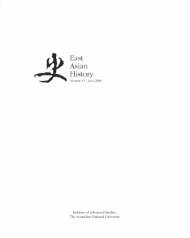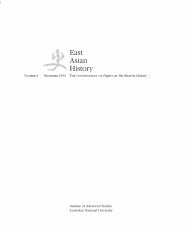156MIRIAM LANG24 See Zhang Zeming, "Di yi bu de changshi-Juexiangyishu zongjie" [The firstanempt: an artistic appraisal of Swan Song),Dianying yisbu cankao ziliao, no.6 (22April 1986), p.4 (a restricted circulation publication).In the next scene, an official in Ou Laoshu's opera troupe informs himthat the publisher to whom he sent his music has rejected it. He adds his owncriticism of Ou's music: "You can't compose that mournful, nondescriptmusic any more ... your ideology is stuck in the old society." (Thisconnection between a composer's ideology and the quality of the music heor she produces will be discussed in more detail below.) He goes on to tellOu Laoshu that it is not enough just to rewrite his music, but that he mustchange his world view as well. He criticizes Ou Laoshu for his nostalgia forthe dissolute lifestyle of the 'old society', reminding him of the anti-Rightistmovement of 1957, the lessons of which he has failed to learn. The officialthen instructs the composer to set to music a revolutionary poem to be sungin the countryside.The two scenes outlined above serve to tell the viewer more about bothOu Laoshu's character and the social category to which he belongs. The filmnever idealizes him or plays for sympathy; he is shown to be constantlynostalgic for the musical and social world of pre-1949 times, foolish,impractical, rather pretentious, and an inconsistent father who neglects hisson to drink with his old friends in the tea-house, spending all of his moneyon them so that there is none left with which to buy food for the boy. Thisportrayal was, in the film-maker Zhang Zeming's own words, a deliberatedeparture <strong>from</strong> the usual over-heroic depictions of musicians in Chinesefiction.24In his dealings with his work unit, Ou Laoshu likewise appears out of stepwith contemporary political realities. The opera company does not value thekind of music he composes, but directs him to produce such music as thepolitical situation dictates; this scene accurately illustrates the controlexercised by the state over musical culture in the Maoist era. Having placedOu Laoshu outside the folk tradition in the preceding scene, the film nowdemonstrates that he does not fit comfortably into his role in the new formsof musical organization either.Part Three25 , a hammered dulcimer.2 6 He Dasha's name is not given an entry ineither Zbongguo yinyue cidian [Dictionaryof Chinese music] (Beijing: Renmin YinyueChubanshe, 1984) or Zbongguo yinyuesbilUe. He is briefly mentioned by ZhouHaihong, however, in connection with YanLaolie and other figures in Cantonese instrumentalmusic ("Weiji zhong de jueze: p.20)and by association with He Iiutang (Zbongguoyinyue cidian, p.149).The impact of politics on musical culture is alluded to again in subsequentscenes where we see Guanzai, Ou Laoshu's son, practising the yangqin.25He asks A Xiang, the old blind folk musician, to teach him "The Monk Seeksa Wife," only to be told that this piece is currently considered "obscene" andis therefore forbidden. After this exchange, Guanzai's father returns andprepares to teach him one of He Liutang's compositions. Guanzai wouldrather study the music of He Dasha fiiJ jdl, saying that he is the greatest ofthe Cantonese composers.26 Ou Laoshu tells tall stories of the closerelationship between himself and He Liutang ("We were blood brothers")and brags of having paid He's debts for him; his son, however, knows this
TRADITIONAL MUSICIANS IN CONTEMPORARY CHINA157to be untrue. Ou reprimands Guanzai for playing with his qinzheng,27 tellinghim that it is extremely valuable, having been made by a master in 1911, andthat he went through considerable hardship to obtain it. After an argumentabout Ou Laoshu's financial irresponsibility, Ou goes to borrow money forfood and Guanzai runs away. First the boy looks in on a girls' choir rehearsal,then he goes to the theatre to see an opera performance. His mother, OuLaoshu's former wife, is performing. After the show, he lingers to watchunobserved as his mother and half-sister leave the theatre and board the busto return home. They are well-dressed, glamorous, obviously prosperous,and affectionate. Saddened, he runs off.A Xiang's use of the word 'obscene' to describe a piece of yangqin musicreflects an issue that has been important in Chinese music since 1949, andin particular during the Cultural Revolution, namely, the identification ofmusical content with programmatic titles. Most Chinese music is programmatic;some titles evoke the beauties of nature and the composer's responseto them (such as Three Variations on Plum Blossom 28 or Spring Dawn onthe Snowy Mountain 29). Others (often taken <strong>from</strong> works of literature) referto China's historic and legendary past (such as Autumn Moon in the HanPalace 30 or Hegemon King Takes offhis Armour31). In a society where arthas so often been employed for overtly political ends, both types of title havebeen regarded by political leaders as at best questionable and at worstdownright dangerous. During the Cultural Revolution, for example, titlesreferring to nature or to inconvenient episodes <strong>from</strong> the 'feudal' past weresuppressed in favour of newly-created works such as Delivering Grain to theState and Fighting the Typhoon.32One interesting illustration of the importance of a correct programmeis the contrasting treatment which has been given to two very similarpipa solo works which are both supposed to represent the same battle.Hegemon King Takes Off His Armour was suppressed in the CulturalRevolution for supposedly expressing Confucianist sympathies towardsthe defeated aristocrat Xiang Yu, while Ambush on All Sides was vauntedfor depicting the victory of the peasant leader Liu Bang over Confucianismand feudalism.33 The assumption that if the programme is unacceptablethen the music must also by definition be bad also worked in reverse: awell-known traditional tune could become acceptable with the addition ofa new revolutionary programmatic title. The Water in the River 34 ("whichconveys the sorrows of the labOUring masses before liberation and the27 •• , a plucked zither.28 Meihua sannong *,1E':::1f, a frequentlyplayedpiece for solo guqin supposedlydating <strong>from</strong> the Jin dynasty (26)-420).29 Xueshan chun.xiao.Lit41!Jl a guzhengsolo <strong>from</strong> the 1950s or 60s by Fan Shang'e.H.30Hangong qiuyue ilO1ftkJ:l, a piece forsolo guzheng supposedly descriptive of thesadness of Wang Zhaojun, a Han palacewomansent to marry a Xiongnu ruler.31 Bawang xiejia CU:tlllfl, a pipa piecesupposedly descriptive of the decisive barriebetween Xiang Yu (the ruler of Chu) and UuBei (founder of the Han dynasty) for controlof China in the third century Be.32 Delivering grain to the state (Song gongliangj!:fIl); Fighting the typhoon (ZhantaifengPJJ by Wang Changyuan zmft. Wu Choukuang, "lbe erhu and pipa,"Chinese Literature, 1975, no.l, pp.lOO-5, at101; Anon., "New music for an ancientinstrument," p.14.33 Shimian maifu +ilitJfjt. Feng Wensi,"Uie lun Shimian maifu ' [A brief discussionof Ambush on all sides 1, Yinyue luncong,1978, pp.207-19.34 Jianghe shui iIfiiJ *, a melody <strong>from</strong> the1950s.35 Wu Chou-kuang, "Erhu and pipa," p.l01.36 Liuyang he i.t1JllafiiJ, a song <strong>from</strong> Hunanprovince.37 Wu Chou-kuang, "Erhu and pipa," p.l04.38 It might be conjectured that He Dasha'somission <strong>from</strong> musical texts was the result ofideological objections. I have no evidence tosupport such a hypothesis, but this kind ofexclusion on ideological grounds is notunusual in PRC reference works.people's hatred and revolt against the iniquitous old society"35) andLiuyang River 36 ("which with its exquisite melody expresses our revolutionarypeople's love and admiration for Chairman Mao"37) are good examplesof this.Another reason for the rejection of certain compositions during variousperiods in recent Chinese history was the idea that if the life-style of themusician is questionable, then his or her music will be questionable as well.38


